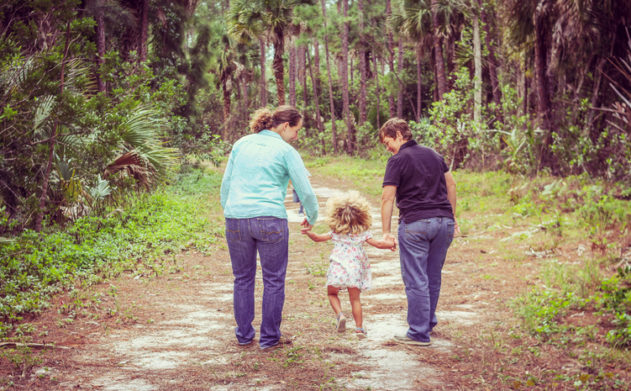The oppressive dragon feminists need to slay is not just that a woman’s value lies solely in reproduction. We must also topple the idea that non-disabled, opposite sex, cisgendered married couples with children are the foundation of society.
Role Reboot recently published an essay by Amy Monticello where the author argues for a woman’s right to privacy and respect around any and all of her reproductive choices. It’s not a new argument but one that is intensely relevant as the essay’s release came just a day after neo-Nazis had the audacity to claim that the death of Charlottesville victim Heather Heyer was merited because women like her without children are a burden to society. This and more subtle pushes to reduce women to their ovaries and uterus are why reproductive choice is the basic building block to women’s freedom.
The neo-Nazis take the extreme viewpoint that a woman’s only value is in her ability to reproduce. While the majority of both women and men disagree with this stance, Monticello makes a very important point about our response:
But in America, we have a tendency to answer extremism with extremism, and I don’t want to see calls for the rightful honoring of women who choose not to have kids become implications of women who do.
Feminists often talk about the decision to not reproduce as a noble and defiant act. However, you can’t have freedom when any choice is morally elevated over other decisions.
As a lesbian, this fact is tremendously important to me. Only two years after LGBTQ people won the right to marry, I am constantly inundated by feminist articles arguing that marriage is at best antiquated and at worst oppressive. My partner and I married in Canada when such unions were still illegal in the United States because the ritual of commitment was important to us. The recognition of that marriage in 2015 was an extremely meaningful advance in social equality. As I’ve written before, our relationship is not a same-sex revisitation of oppressive marital roles, it’s a partnership that deserves the same feminist credibility as disavowal of the institution entirely. The bias toward celebrating the decision not to marry is not promoting choice; it’s an attempt to establish a new social norm.
The issue resonates even more strongly when it comes to matters of parenting. Here Monticello misses the mark a bit. Her full call to inclusivity is as follows:
I know mainstream society has been way more terrible about judging women without kids than the other way around. But in America, we have a tendency to answer extremism with extremism, and I don’t want to see calls for the rightful honoring of women who choose not to have kids become implications of women who do.
Monticello is on the right track here in pushing choice over a specific outcome but her leading statement does not reflect the reality of all women. If we include the experiences of marginalized women, such as single mothers (especially women of color), LGBTQ women, and women with a disability, we find extreme discrimination and hatred toward some women’s choice to mother. There’s no benefit to arguing about which bias is harsher—all judgments are unacceptable.
The oppressive dragon feminists need to slay is not just that a woman’s value lies solely in reproduction. We must also topple the idea that non-disabled, opposite sex, cisgendered married couples with children are the foundation of society. To deviate in any way—whether it be to not have children or to have children outside of that narrow social norm—is vilified as unnatural and harmful to both the children involved and society at large.
LGBTQ people are often banned from adopting or fostering children because of their identity. The content of their character and readiness to parent are ignored. Single mothers are labeled “welfare queens” who have children only to increase their government benefits. Disabled mothers have their children removed from their care based only on the existence of their disability, not on their capacity to parent. These outrages are all imposed by people who generally fall far short of extremist neo-Nazis. Too few people, including too few feminists, feel the outrage that is merited by these obstructions to our reproductive freedom.
While I wish Monticello had more specifically called out these forms of discrimination, I don’t judge too harshly because I know that I also have blind spots around how different women experience reproductive oppression. We all have them. This is why I support her in her main argument that feminism needs to avoid setting new norms around reproduction and instead focus on protecting the right of each individual to make her own choices. Anything else leaves some women out of the struggle.
Anne Penniston Grunsted writes about parenting, disability, and family life from her perspective as a lesbian mama. She has been published in The Washington Post, Brain, Child Magazine, and Mamamia. She lives in Southern California with her partner and son.
Other Links:

